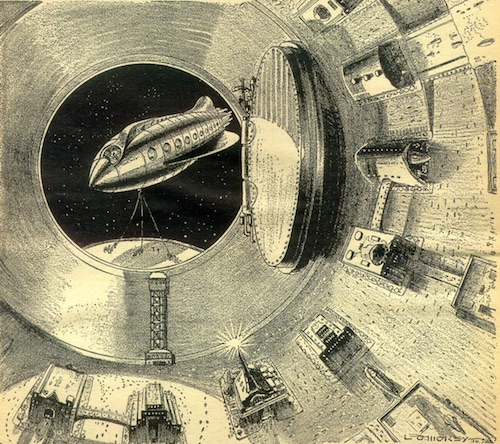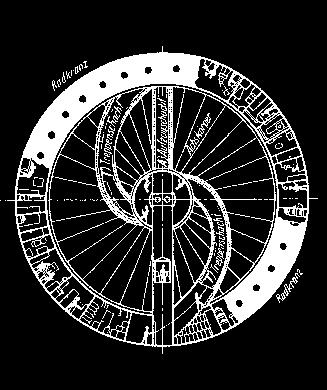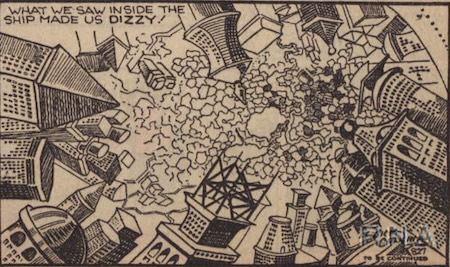Science Fiction
Dictionary
A B C D E F G H I J K L M N O P Q R S T U V W X Y Z
Latest By
Category:
Armor
Artificial
Intelligence
Biology
Clothing
Communication
Computers
Culture
Data Storage
Displays
Engineering
Entertainment
Food
Input Devices
Lifestyle
Living Space
Manufacturing
Material
Media
Medical
Miscellaneous
Robotics
Security
Space Tech
Spacecraft
Surveillance
Transportation
Travel
Vehicle
Virtual
Person
Warfare
Weapon
Work
"I'm strictly an ivory-tower person. I can explain things but I can't do things."
- Isaac Asimov
| City of Space | ||
| A very early reference to an enormous cylindrical space station. |
This is the earliest reference found (thus far) in science fiction for the idea of a cylindrical space station that is spun to create artificial gravity.
| "The City of Space is in a cylinder," Captain Smith said. "Roughly five thousand feet in diameter, and about that high. it is built largely of meteoric iron which we captured from a meteoric swarm making navigation safe and getting useful metal at the same time. The cylinder whirls constantly, with such speed that the centrifugal force against the sides equals the force of gravity on the earth. The city is built around the inside of the cylinder - so that one can look up and see his neighbor's house, apparently upside down, a mile above his head. We enter through a lock in one end of the cylinder."
A vast disk of dull black metal was now visible a few yards outside the vitrolite panels. A huge metal valve swung open in it, revealing a bright space beyond. The Red Rover moved into the chamber, the mighty valve closed behind her, air hissed in about her, an inner valve was opened, and she slipped into the City of Space.
 (The city of space by Jack Williamson) They were, Bill saw, at the center of an enormous cylinder. The sides, half a mile away, above and below them, were covered with buildings along neat, tree-bordered streets, scattered with green lawns, tiny gardens, and bits of wooded park. It seemed very strange to Bill, to see these endless streets about the inside of a tube, so that one by walking a little over three miles in one direction would arrive again at the starting point, in the same way that one gets back to the starting point after going around the earth in one direction. At the ends of the cylinder, fastened to the huge metal disks, which closed the ends, were elaborate and complex mechanisms, machines strange and massive. "They must be for heating the city," Bill thought, "and for purifying the air, for furnishing light and power, perhaps even for moving it about." The lock through which they had entered was part of this mechanism. In the center of each end of the cylinder hung a huge light, seeming large and round as the sun, flooding the place with brilliant mellow rays... They entered an elevator. Three minutes later they stepped off upon the side of the great cylinder that housed the City, and en- tered a low building with a broad concrete road curving up before it. As they stepped out, it gave Bill a curious dizzy feeling to look up and see busy streets, inverted, a mile above his head. The road before them curved smoothly up on either hand, bordered with beautiful trees, until its ends met again above his head. The centrifugal force that held objects against the sides of the cylinder acted in precisely the same way as gravity on the earth—except that it pulled away from the center of the cylinder, instead of toward it. |
| Technovelgy from The Prince of Space,
by Jack Williamson. Published by Amazing Stories in 1931 Additional resources -
|
This same idea is stated in detail in The Problem of Space Travel - The Rocket Motor, written by Herman Potočnik (pseudonym Hermann Noordung) in 1928. The book was published in German in 1929, and was translated into Russian in 1935; it was finally translated into english by NASA in 1999).

(Herman Potočnik Habitat Wheel (author's illustration))
These conditions are, however, best fulfilled when the station is laid out in the shape of a large wheel as previously indicated: the rim of the wheel is composed out of cells and has the form of a ring braced by wire spokes towards the axis. Its interior is separated into individual rooms by partitions; all rooms are accessible from a wide corridor going around the entire station. There are individual rooms, larger sleeping bays, work and study areas, mess hall, laboratory, workshop, dark room, etc., as well as the usual utility areas, such as a kitchen, bath room, laundry room and similar areas. All rooms are furnished with modern day comforts; even cold and warm water lines are available. In general, the rooms are similar to those of a modern ship. They can be furnished just like on Earth because an almost normal, terrestrial gravitational state exists in these rooms...While the force of gravity is directed towards the center of mass, the centrifugal force, on the other hand, is directed away from the center. Therefore, "vertical" in the habitat wheel means the reverse of on Earth: the radial direction from the center (from the axis of rotation) directed outward. Accordingly, "down" now points towards the perimeter and at the same time to the "lowest" part, while "up" now points towards the axis and at the same time to the "highest" point of this manmade celestial body. Taking its smallness into account, the radial orientation of the vertical direction, which in most cases is irrelevant on the Earth due to its size, now clearly becomes evident in the space station. The consequence of this is that all "vertical" directions (such as those for human beings standing erect, the partitions of the rooms, etc.) are now convergent instead of parallel to one another, and everything "horizontal" (e.g., water surface of the bathtub) appears curved instead of flat.
(From The Habitat Wheel
[The Problem of Space Travel - The Rocket Motor])
His ideas spread rapidly in the nascent rocketry and aeronautics groups of the time, despite the lack of translations; it's likely that Williamson picked up on them.
Williamson's story was published in January of 1931; by fall of that year, Nowlan and Calkin published what is probably the first art view of the interior of a rotating cylindrical habitat:

(Cylindrical World View from 'Buck Rogers, 2431' by Nowlan and Calkin)
As a space station, compare to the brick moon from The Brick Moon (1869) by Edward Everett Hale, the silica sphere (Dyson sphere) from Lost City of Mars (1934) by Harl Vincent, the New Moon Casino from One Against the Legion (1939) by Jack Williamson, the asteroid space station from Misfit (1939) by Robert Heinlein, the Venus Equilateral Relay Station from QRM - Interplanetary (1942) by George O. Smith, Wheelchair from Waldo (1942) by Robert Heinlein, the space transfer station from Between Planets (1951) by Robert Heinlein, the Sargasso Asteroid from The Stars My Destination (1956) by Alfred Bester, the tether space station from Tank Farm Dynamo (1983) by David Brin and the high orbit archipelago from Mona Lisa Overdrive (1988) by William Gibson.
Thanks to Fred Kiesche of The Eternal Golden Braid for providing the quote for this item.
Comment/Join this discussion ( 2 ) | RSS/XML | Blog This |
Additional
resources:
More Ideas
and Technology from The Prince of Space
More Ideas
and Technology by Jack Williamson
Tech news articles related to The Prince of Space
Tech news articles related to works by Jack Williamson
City of Space-related
news articles:
- American Space Colony Art
- Space Hotel Will Have Artificial Gravity By 2025
| The New Habitable Zones Include Asimov's Ribbon Worlds |
| Will Space Stations Have Large Interior Spaces Again? |
| Reflect Orbital Offers 'Sunlight on Demand' And Light Pollution |
| Chrysalis Generation Ship to Alpha Centauri |
Want to Contribute an
Item?
It's easy:
Get the name of the item, a
quote, the book's name and the author's name, and Add
it here.
| <Previous | Next> |
|
|
|
Technovelgy (that's tech-novel-gee!) is devoted to the creative science inventions and ideas of sf authors. Look for the Invention Category that interests you, the Glossary, the Science Fiction Invention Timeline, or see what's New.
|
Science Fiction
Timeline
1600-1899
1900-1939
1940's 1950's
1960's 1970's
1980's 1990's
2000's 2010's
'...there's a narrow belt where the climate is moderate.'
'... with the Master-operator all you have to do is push one! A remarkable achievement!'
'Not like me. A T-1000, advanced prototype. A mimetic poly-alloy. Liquid metal.'
'It was riddled with holes that were the mouths of tunnels.'
'The massive feet working the pedals, arms and hands flashing and glinting...'
'There were cubic miles of it, and it glistened like a silvery Christmas tree...'
'Jason had been guiding the caravan of cars as usual...'
"The robot solemnly hit a ball against the wall, picked it up and teed it, hit it again, over and again...'
